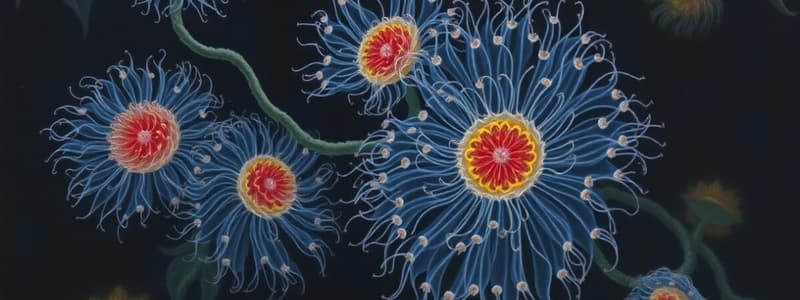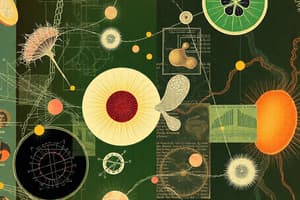Podcast
Questions and Answers
What is the primary focus of microbiology?
What is the primary focus of microbiology?
- Study of ecosystems
- Study of microorganisms (correct)
- Study of plants
- Study of heredity and variation
Which cell type is characterized by the absence of a nucleus?
Which cell type is characterized by the absence of a nucleus?
- Neuronal cells
- Muscle cells
- Prokaryotic cells (correct)
- Eukaryotic cells
Which organelle is known as the powerhouse of the cell?
Which organelle is known as the powerhouse of the cell?
- Ribosome
- Nucleus
- Mitochondria (correct)
- Golgi Apparatus
What does the Law of Segregation state?
What does the Law of Segregation state?
What is natural selection primarily responsible for?
What is natural selection primarily responsible for?
Which of the following best defines homeostasis?
Which of the following best defines homeostasis?
What is the primary function of photosynthesis?
What is the primary function of photosynthesis?
Which of the following best describes a biome?
Which of the following best describes a biome?
Flashcards are hidden until you start studying
Study Notes
Basic Concepts of Biology
-
Definition: Biology is the scientific study of life and living organisms.
-
Branches of Biology:
- Zoology: Study of animals.
- Botany: Study of plants.
- Microbiology: Study of microorganisms.
- Genetics: Study of heredity and variation.
- Ecology: Study of ecosystems and interactions among organisms.
Cell Biology
-
Cell Theory:
- All living organisms are composed of cells.
- Cells are the basic units of life.
- All cells arise from pre-existing cells.
-
Cell Types:
- Prokaryotic Cells: No nucleus; examples include bacteria.
- Eukaryotic Cells: Have a nucleus; examples include plant and animal cells.
-
Cell Organelles:
- Nucleus: Contains genetic material (DNA).
- Mitochondria: Powerhouse of the cell; produces energy (ATP).
- Ribosomes: Sites of protein synthesis.
- Endoplasmic Reticulum (ER): Involved in protein and lipid synthesis.
- Golgi Apparatus: Modifies, sorts, and packages proteins.
Genetics
- DNA Structure: Double helix composed of nucleotides (A, T, C, G).
- Genes: Segments of DNA that code for proteins.
- Alleles: Different forms of a gene.
- Mendelian Genetics:
- Law of Segregation: Each parent contributes one allele to offspring.
- Law of Independent Assortment: Genes for different traits are inherited independently.
Evolution
- Natural Selection: Process by which organisms better adapted to their environment tend to survive and reproduce.
- Common Descent: The theory that all living organisms share a common ancestor.
- Species: A group of organisms that can interbreed and produce fertile offspring.
Ecology
- Ecosystem: A community of living organisms and their interactions with their environment.
- Biomes: Large regions characterized by specific climate conditions and distinct plant/animal communities.
- Food Chains/Webs: Represent the flow of energy and nutrients through ecosystems.
Physiology
- Homeostasis: The maintenance of stable internal conditions in an organism.
- Organ Systems: Groups of organs that work together to perform complex functions (e.g., circulatory, respiratory, digestive).
Major Biological Processes
- Photosynthesis: Process by which plants convert light energy into chemical energy (glucose) using carbon dioxide and water.
- Cellular Respiration: Process by which cells convert glucose and oxygen into energy, carbon dioxide, and water.
- Metabolism: The sum of all chemical reactions that occur within an organism.
Molecular Biology
- Proteins: Made of amino acids; essential for structure and function of cells.
- Enzymes: Biological catalysts that speed up chemical reactions.
- RNA: Plays a key role in gene expression and protein synthesis.
Classification of Life
- Taxonomy: Science of classification of organisms.
- Domains: Bacteria, Archaea, Eukarya.
- Kingdoms: Animalia, Plantae, Fungi, Protista, Bacteria, Archaea.
Importance of Biology
- Understanding health and disease.
- Conservation of ecosystems and biodiversity.
- Agricultural advancements.
- Biotechnology and genetic engineering.
Basic Concepts of Biology
- Biology is the study of living organisms, encompassing diverse disciplines like the study of animals (zoology), plants (botany), microorganisms (microbiology), heredity and variation (genetics), and interactions within ecosystems (ecology).
Cell Biology
- The cell is the fundamental unit of life, as stated by the cell theory, which highlights that all living organisms are composed of cells, cells are the fundamental units of life, and new cells arise from pre-existing cells.
- Cells are broadly categorized into prokaryotic cells, lacking a nucleus, exemplified by bacteria, and eukaryotic cells, possessing a nucleus, including plant and animal cells.
- Key cellular components, known as organelles, perform specific functions within cells.
- The nucleus houses the cell's genetic material (DNA).
- Mitochondria are the energy powerhouses of the cell, producing ATP.
- Ribosomes synthesize proteins.
- The endoplasmic reticulum (ER) plays a crucial role in protein and lipid synthesis.
- The Golgi apparatus modifies, sorts, and packages proteins.
Genetics
- DNA, the molecule of heredity, takes the form of a double helix composed of nucleotides, specifically adenine (A), thymine (T), cytosine (C), and guanine (G).
- Genes, segments of DNA, hold the instructions for building proteins.
- Alleles are alternative forms of a gene, contributing to variation within populations.
- Mendelian genetics, based on Gregor Mendel's groundbreaking work, lays out fundamental principles of inheritance.
- The Law of Segregation dictates that each parent contributes one allele to their offspring.
- The Law of Independent Assortment states that genes governing different traits are inherited independently of one another.
Evolution
- Natural selection drives evolutionary change, favoring organisms better adapted to their environment, increasing their survival and reproductive rates.
- The concept of common descent posits that all living organisms share a common ancestor, tracing their lineage back through evolutionary history.
- A species represents a group of organisms capable of interbreeding and producing fertile offspring, defining a distinct lineage within the tree of life.
Ecology
- An ecosystem comprises a community of living organisms interacting with their abiotic environment.
- Biomes are large-scale ecosystems characterized by distinctive climate conditions and associated plant and animal communities.
- Food chains and food webs depict the flow of energy and nutrients within an ecosystem.
Physiology
- Homeostasis, a defining characteristic of life, refers to the maintenance of stable internal conditions within an organism, essential for proper functioning.
- Organ systems, groups of organs working together, perform complex functions vital for life. Examples include the circulatory, respiratory, and digestive systems.
Major Biological Processes
- Photosynthesis, undertaken by plants and some other organisms, captures light energy and converts it into chemical energy (glucose) utilizing carbon dioxide and water.
- Cellular respiration, a fundamental process of life, breaks down glucose with oxygen, releasing energy, carbon dioxide, and water.
- Metabolism encompasses all the chemical reactions taking place within an organism, facilitating growth, repair, and other life processes.
Molecular Biology
- Proteins, the workhorses of the cell, are composed of amino acids, essential for structure, function, and regulation.
- Enzymes, biological catalysts, accelerate chemical reactions crucial for life processes, contributing to efficiency and regulation.
- RNA, a nucleic acid, plays crucial roles in gene expression and protein synthesis.
Classification of Life
- Taxonomy, the science of classifying organisms according to their relatedness, provides a framework for understanding the vast diversity of life.
- The three domains – Bacteria, Archaea, and Eukarya – represent the broadest levels of biological classification, reflecting fundamental differences in cellular organization and evolutionary history.
- Kingdoms encompass broader groups within domains, including Animalia, Plantae, Fungi, Protista, Bacteria, and Archaea.
Importance of Biology
- Biology forms the fundamental basis for understanding health and disease, enabling the development of treatments and preventive measures.
- Conservation efforts depend on understanding ecological principles to protect biodiversity and preserve ecosystems.
- Agricultural advancements rely on biological knowledge to increase crop yields and develop sustainable practices.
- Biotechnology and genetic engineering leverage biological principles for various applications, including disease treatment, genetic modification, and production of valuable products.
Studying That Suits You
Use AI to generate personalized quizzes and flashcards to suit your learning preferences.



